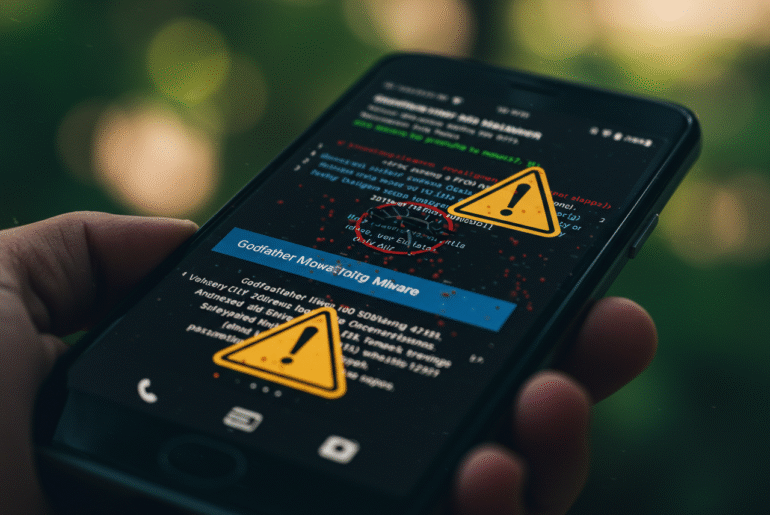This article may contain references to products or services from one or more of our advertisers or partners. We may receive compensation when you click on links to those products or services. Nonetheless, our opinions are our own.
The information presented in this article is accurate to the best of our knowledge at the time of publication. However, information is subject to change, and no guarantees are made about the continued accuracy or completeness of this content after its publication date.
- Godfather Malware Threatens Android Mobile Banking Security
- What Is Godfather Malware?
- How Godfather Malware Operates on Android Devices
- Methods of Distribution and Infection
- Indicators of Infection
- Preventive Measures for Android Users
- Responding to a Suspected Infection
- What Financial Institutions Should Be Doing
- Staying Vigilant in a Changing Threat Landscape
- Frequently Asked Questions
- Recommended Reads
Godfather Malware Threatens Android Mobile Banking Security
Mobile banking safety is under scrutiny in today’s connected financial landscape. A new cybersecurity threat, identified as Godfather malware, has surfaced and is actively targeting Android banking applications. Unlike standard malicious software, this banking trojan employs deceptive tactics to compromise user credentials and disrupt digital financial activity.

This threat is not only sophisticated in its methods but also broad in its reach, impacting hundreds of financial institutions through impersonation techniques that make detection difficult and prevention even more challenging.
What Is Godfather Malware?
Godfather malware is a type of Android-based banking trojan engineered to intercept user credentials and sensitive financial data. It operates by simulating legitimate user interfaces of financial applications, tricking individuals into revealing login details and authentication codes.
This malware has reportedly imitated the design and functions of over 400 banking, cryptocurrency, and fintech apps, including institutions based in the United States, Canada, Germany, France, and Turkey. Its deceptive precision creates a convincing illusion that dupes even the most cautious users.
How Godfather Malware Operates on Android Devices
The operation of Godfather malware is marked by a series of covert actions that begin once the malicious app is installed:
- Overlay Attack Mechanism: The malware creates false login screens layered over legitimate banking apps. When users enter their credentials, they are unknowingly passing the data to threat actors.
- Two-Factor Authentication Bypass: It intercepts one-time passcodes from SMS and push notifications, allowing attackers to override security protocols.
- Access to Sensitive Permissions: The malware often requests intrusive permissions under seemingly valid pretenses, giving it deeper control over the device.
- Remote Control Capabilities: In some versions, attackers can remotely operate the infected device to perform unauthorized transactions.
Once embedded in the system, Godfather remains difficult to detect without security tools specifically designed to flag malicious overlays or unauthorized data access.
Methods of Distribution and Infection
The malware typically spreads through trojanized applications, apps that appear genuine but are injected with harmful code. These are frequently disguised as utility tools, lifestyle apps, or even financial management software. While many are hosted on unofficial third-party app stores, in some cases, even listings on trusted platforms may be compromised through repackaged APK files.
Sideloading apps from outside the Google Play ecosystem significantly increases the risk of installing such malware.
Voted "Best Overall Budgeting App" by Forbes and WSJ
Monarch Money helps you budget, track spending, set goals, and plan your financial future—all in one app.
Get 50% OFF your first year with code MONARCHVIP
Indicators of Infection
Identifying a compromised device can be difficult, but certain behavioral changes may serve as early warnings:
| Suspicious Behavior | Potential Cause |
|---|---|
| Unusual battery drain | Malware running background tasks |
| Slow or erratic app performance | Resource hijacking by malicious code |
| New apps are appearing without consent | Unauthorized downloads via malware |
| Notifications of unauthorized access | Attempted or successful logins |
These indicators, while not definitive, suggest that a deeper inspection is warranted, especially if financial activity has been affected.
Preventive Measures for Android Users
Avoiding threats like the Godfather requires a layered approach to device and data protection. Users can minimize risk by adopting smart usage habits and technical safeguards:
- Download Apps Only from Verified Sources: Stick to the Google Play Store or verified company websites.
- Enable Automatic Software Updates: These updates often contain security enhancements that address known vulnerabilities.
- Install a Trusted Mobile Security Application: Use security solutions that specialize in real-time threat detection for Android systems.
- Limit App Permissions: Review and restrict apps that request access to messages, contacts, or other sensitive information unrelated to their function.
- Avoid Using Public Wi-Fi for Financial Tasks: Utilize a secured mobile network or a trusted VPN when conducting banking transactions.
- Regularly Review Account Activity: Set up alerts or monitor statements to quickly identify unauthorized access or transactions.
Responding to a Suspected Infection
If you suspect your device may be compromised by Godfather malware, take the following immediate steps:
- Disconnect the device from all networks to prevent data from being transmitted to attackers.
- Change all passwords, particularly for banking and email accounts.
- Notify your financial provider, who may temporarily lock your accounts or implement additional authentication.
- Run a full scan using mobile security software to identify and remove the threat.
- Factory reset the device as a last resort, after backing up necessary non-sensitive data.
Timely action can significantly reduce the impact of a malware incident and help prevent further data loss or financial fraud.
What Financial Institutions Should Be Doing
As mobile banking becomes central to customer engagement, financial institutions also bear responsibility in combating threats like Godfather. These measures can enhance protection at the institutional level:
- Integrate multi-layer authentication systems that detect anomalies in user behavior.
- Employ real-time fraud detection algorithms based on usage patterns.
- Educate clients regularly on safe mobile practices and emerging threats.
- Monitor app store listings for impersonations or malicious clones.
Proactive security strategies are no longer optional in the financial ecosystem; they are a fundamental component of consumer trust and operational integrity.
Staying Vigilant in a Changing Threat Landscape
Mobile financial security is being tested by increasingly adaptive malware like Godfather. As more users turn to digital banking solutions, the potential impact of these threats continues to grow. Cybercriminals are not just exploiting technical vulnerabilities; they are targeting behavioral habits and trust.
Through vigilance, informed decision-making, and strategic safeguards, both individuals and financial institutions can create stronger barriers against intrusion. Maintaining mobile hygiene is no longer simply recommended; it is necessary for financial safety.
Frequently Asked Questions
What is Godfather malware targeting?
Godfather targets Android users by impersonating banking and financial apps to harvest login details and authentication credentials.
How does it get onto devices?
Primarily through malicious apps disguised as legitimate tools. These are often downloaded from unofficial app sources or repackaged APK files.
Is Godfather still active?
Yes. The malware is actively monitored by cybersecurity firms and continues to evolve in how it conceals itself and bypasses standard protections.
Are iPhones affected by Godfather malware?
No known variants of Godfather currently affect iOS devices. However, users on all platforms should remain cautious, as malware techniques evolve rapidly.
Can antivirus software detect Godfather?
Modern mobile security tools can detect Godfather, especially those with behavior-based threat detection capabilities. Regular updates ensure better performance in catching new variants.
What happens if my banking app is impersonated?
If you input credentials into a fraudulent overlay, attackers may gain full access to your financial accounts. Immediate action, changing passwords and contacting your bank, is necessary.

Reviewed and edited by Albert Fang.
See a typo or want to suggest an edit/revision to the content? Use the contact us form to provide feedback.
At FangWallet, we value editorial integrity and open collaboration in curating quality content for readers to enjoy. Much appreciated for the assist.
Did you like our article and find it insightful? We encourage sharing the article link with family and friends to benefit as well - better yet, sharing on social media. Thank you for the support! 🍉
Article Title: Godfather Malware Targets Android Banking Apps
https://fangwallet.com/2025/07/02/godfather-malware-targets-android-banking-apps/The FangWallet Promise
FangWallet is an editorially independent resource - founded on breaking down challenging financial concepts for anyone to understand since 2014. While we adhere to editorial integrity, note that this post may contain references to products from our partners.
The FangWallet promise is always to have your best interest in mind and be transparent and honest about the financial picture.
Become an Insider

Subscribe to get a free daily budget planner printable to help get your money on track!
Make passive money the right way. No spam.
Editorial Disclaimer: The editorial content on this page is not provided by any of the companies mentioned. The opinions expressed here are the author's alone.
The content of this website is for informational purposes only and does not represent investment advice, or an offer or solicitation to buy or sell any security, investment, or product. Investors are encouraged to do their own due diligence, and, if necessary, consult professional advising before making any investment decisions. Investing involves a high degree of risk, and financial losses may occur including the potential loss of principal.
Source Citation References:
+ Inspo
There are no additional citations or references to note for this article at this time.











































